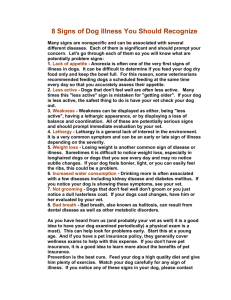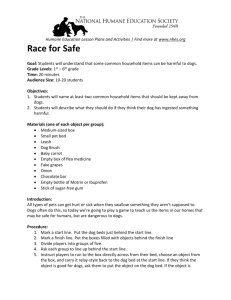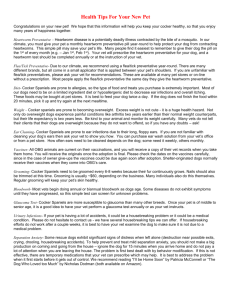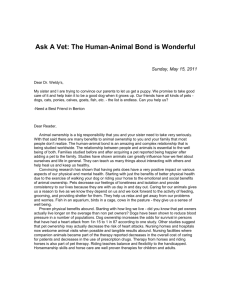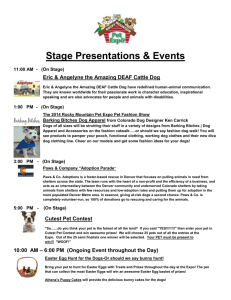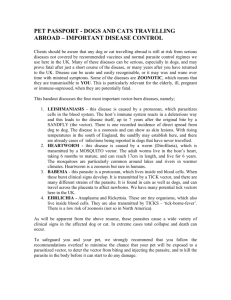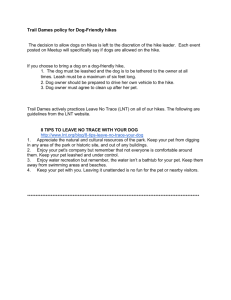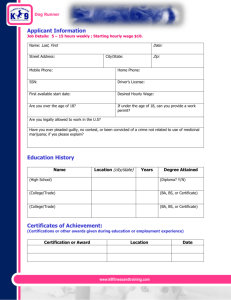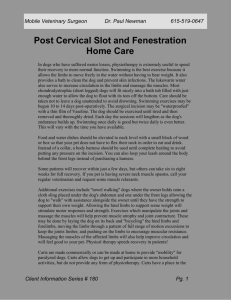July & August Newsletter - SUMMER FIRST AID
advertisement
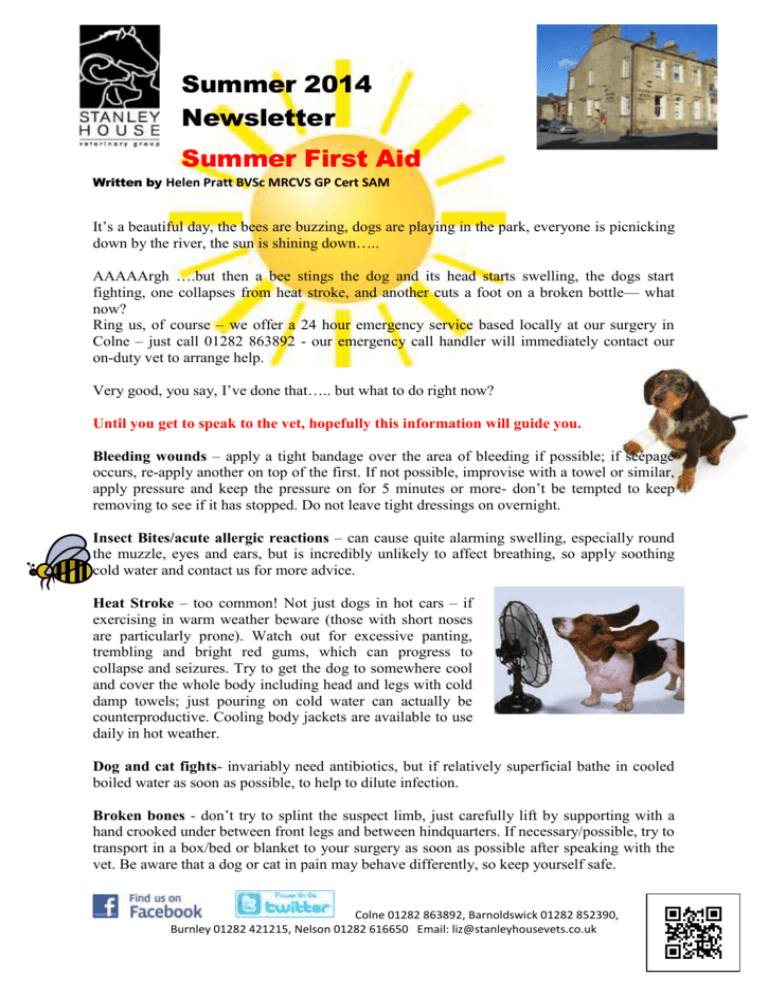
Summer 2014 Newsletter Summer First Aid Written by Helen Pratt BVSc MRCVS GP Cert SAM It’s a beautiful day, the bees are buzzing, dogs are playing in the park, everyone is picnicking down by the river, the sun is shining down….. AAAAArgh ….but then a bee stings the dog and its head starts swelling, the dogs start fighting, one collapses from heat stroke, and another cuts a foot on a broken bottle— what now? Ring us, of course – we offer a 24 hour emergency service based locally at our surgery in Colne – just call 01282 863892 - our emergency call handler will immediately contact our on-duty vet to arrange help. Very good, you say, I’ve done that….. but what to do right now? Until you get to speak to the vet, hopefully this information will guide you. Bleeding wounds – apply a tight bandage over the area of bleeding if possible; if seepage occurs, re-apply another on top of the first. If not possible, improvise with a towel or similar, apply pressure and keep the pressure on for 5 minutes or more- don’t be tempted to keep removing to see if it has stopped. Do not leave tight dressings on overnight. Insect Bites/acute allergic reactions – can cause quite alarming swelling, especially round the muzzle, eyes and ears, but is incredibly unlikely to affect breathing, so apply soothing cold water and contact us for more advice. Heat Stroke – too common! Not just dogs in hot cars – if exercising in warm weather beware (those with short noses are particularly prone). Watch out for excessive panting, trembling and bright red gums, which can progress to collapse and seizures. Try to get the dog to somewhere cool and cover the whole body including head and legs with cold damp towels; just pouring on cold water can actually be counterproductive. Cooling body jackets are available to use daily in hot weather. Dog and cat fights- invariably need antibiotics, but if relatively superficial bathe in cooled boiled water as soon as possible, to help to dilute infection. Broken bones - don’t try to splint the suspect limb, just carefully lift by supporting with a hand crooked under between front legs and between hindquarters. If necessary/possible, try to transport in a box/bed or blanket to your surgery as soon as possible after speaking with the vet. Be aware that a dog or cat in pain may behave differently, so keep yourself safe. Colne 01282 863892, Barnoldswick 01282 852390, Burnley 01282 421215, Nelson 01282 616650 Email: liz@stanleyhousevets.co.uk Summer First Aid Continued… Burns – douse the area as quickly as possible with cold water and keep doing so for at least 5 minutes. Do not rub butter on, and do not apply ice directly to the area, though through a towel is fine. If a large burn, you may be able to temporarily wrap the area in cling-film to protect from contamination. Fits - whilst fitting your pet will most likely be unaware of its surroundings, so ensure they are somewhere safe, away from obstacles and wires. Dogs do not swallow their tongues, so try to keep away from the mouth or they may bite involuntarily. Try to reduce any sensory stimuli- keep quiet and dark. Most epileptic fits only last a couple of minutes, but they may still be disorientated and even aggressive on recovery so, again, be aware of your own safety. Fits lasting longer than 5 minutes need veterinary treatment. Other guidance and advice is available through our online tool, the ‘interactive symptom checker’ on our website: http://www.stanleyhousevets.com/symptom-checker/ Other Summer Dangers Skin cancer- the cat likes basking in the sunshine, should you let it? Well you can’t stop it; but be aware that white cats in particular, with white sun-sensitive ear tips and little pink noses, can develop a skin tumour from UV damage, so slap on the sun cream factor 50 daily to try to reduce this disease occurring. Flystrike in rabbits – soiled and smelly bunny bottoms from diarrhoea, poor hygiene, or lack of self-grooming will attract bluebottle flies, which will lay eggs in the fur and skin. Within a day these can hatch into maggots and will start to eat away the tissue. You must be vigilant – examine the rear end daily. A product is available to apply to the fur, to prevent eggs developing, which has a lasting effect for up to 10 weeks - highly recommended for all rabbits to prevent this horrific condition. Fleas - although a year round problem, are more prevalent in the summer months. Not all flea control products are equally effective. We offer a variety of veterinary licensed products from spot-ons to tablets to ensure your pet remains flea free. Please discuss with us to develop an appropriate prevention program for your pet. THEN SIT BACK AND ENJOY THE SUNSHINE!!!!! Colne 01282 863892, Barnoldswick 01282 852390, Burnley 01282 421215, Nelson 01282 616650 Email: liz@stanleyhousevets.co.uk

